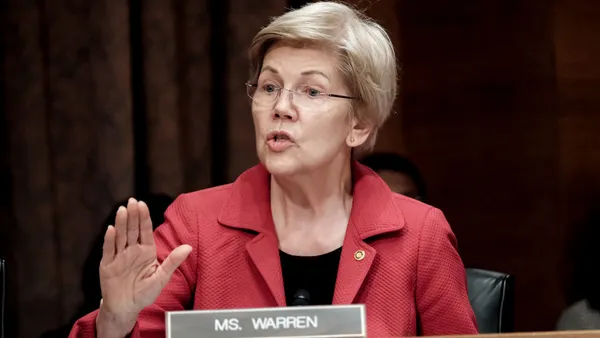Dive Brief:
- Stablecoin issuer Circle and special-purpose acquisition company (SPAC) Concord Acquisition Corp. have mutually terminated their merger once valued at $9 billion, the firms announced Monday.
- The deal to take Circle public had been in the works for 17 months. The companies initially expected the merger, announced in July 2021, to close by the end of that year. The transaction was renegotiated in February, doubling Circle’s valuation from $4.5 billion.
- Under the renegotiation, Concord had until Dec. 10 to close the deal or seek a shareholder vote to extend the timeline to Jan. 31, 2023. That, however, was contingent on the Securities and Exchange Commission (SEC) declaring the prospectus effective. But the regulator had not yet approved the deal.
Dive Insight:
The tie-up’s collapse illustrates how two once-hot sectors — crypto and SPAC mergers — have fallen out of favor. At least 56 SPAC tie-ups have been called off this year — more than double as many as in the previous five years, Bloomberg reported. Four dozen SPACs have seen liquidation this year, and 40 more are expected, according to The Wall Street Journal.
Crypto’s woes, meanwhile, have been well-publicized. The sector’s flagship token, Bitcoin, has shed 75% of its value since a mid-November 2021 peak above $68,000. And a growing handful of firms such as FTX, BlockFi, Celsius and Voyager have declared bankruptcy since July.
Despite the deal’s disintegration, Circle and Concord appear to remain on good terms.
“We are disappointed the proposed transaction timed out,” Circle CEO Jeremy Allaire said Monday. “Concord has been a strong partner and has added value throughout this process, and we will continue to benefit from the advice and support of [its] team.”
Allaire stressed that going public “remains part of Circle’s core strategy.”
“Circle plays a key role in the blockchain’s disruption of financial services,” Concord Chair Bob Diamond, a former CEO of Barclays, said Monday. “I remain confident in Circle’s regulatory-first approach to building trust and transparency in the financial industry, which has never been more important, and I will continue being an advocate for the company as it continues to grow.”
Circle became profitable in 2022’s third quarter, with total revenue and reserve interest income of $274 million and net income of $43 million, the company said in its release Monday. Its stablecoin, USDC, has a market circulation of roughly $43.4 billion, according to CoinGecko. That’s down from a June high around $55 billion, the Financial Times reported.
The company raised $400 million in funding in April from investors, including BlackRock and Fidelity.
Circle’s chief strategy officer, Dante Disparte, told Bloomberg the company may consider raising money again but had no plans to imminently do so. He said Circle plans to increase spending across its business in the coming year.
As for the regulatory process, Allaire called it “thorough.”
“Unfortunately it was a longer process than we had hoped,” he told The Wall Street Journal.
The Circle deal is hardly the first in the finance sphere this year to fall apart over regulators’ lengthy evaluation period. State Street and private bank Brown Brothers Harriman last week called off a $3.5 billion transaction that would have put the latter’s investor services business under State Street’s umbrella.
“The regulatory path forward would involve further delays, and all necessary approvals have not been resolved,” State Street said in a statement Wednesday.
In Circle’s case, “it’s not that the deal fell apart, it’s that the timeline for which the deal had to be qualified was upon us and, for the better part of valor, it seems both organizations made a determination to not renew the deal,” Disparte told Bloomberg.
“For the argument that SPACs do not present strength necessarily, we think there’s a very deep counter narrative to the contrary,” Disparte added. “The desire to not extend it, I think, is more a function of just inertia around getting it authorized.”
Roughly 150 are facing deadlines to complete their mergers, Bloomberg reported — meaning more will likely fall apart.
In a tweet, Allaire expressed a desire to look forward.
“While there are a lot of challenges within the crypto and blockchain industry, I am of the very firm conviction that we are going to decisively leave the speculative value phase and enter the utility value phase, and stablecoins such as USDC will play a huge part," Allaire wrote Monday.












